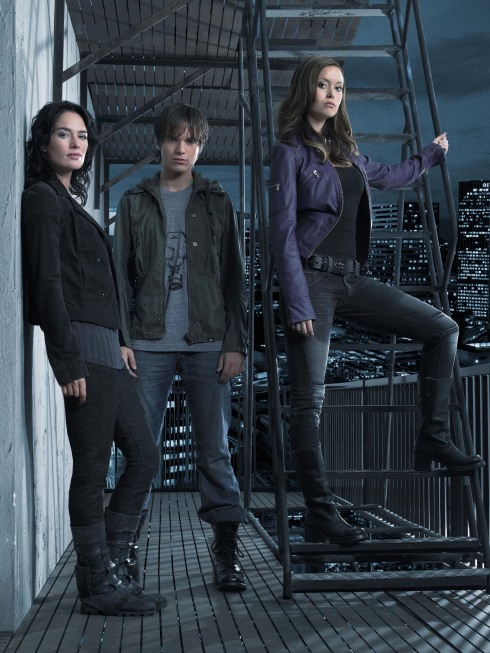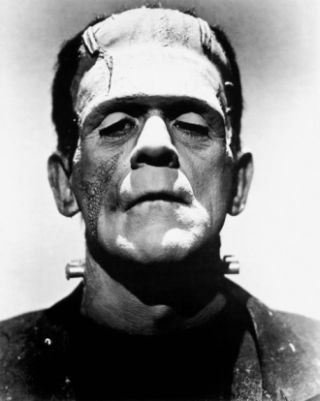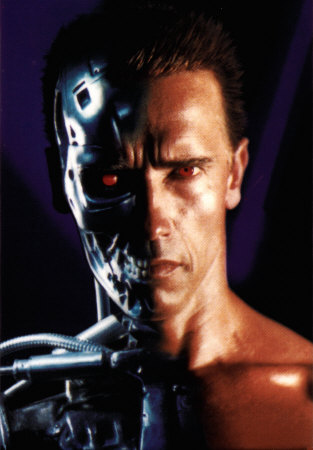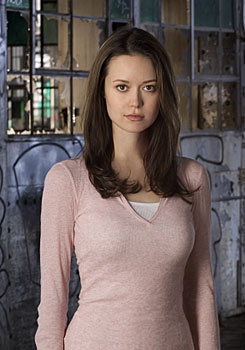I’m enjoying Terminator: The Sarah Connor Chronicles in the same three-quarters, semi-committed way I enjoyed Star Trek Voyager (the other show I’m catching up on via iPod during the writer’s strike): it ain’t Shakespeare, but it’ll do. The FOX network’s new program reinvents the venerable Terminator franchise by serializing it, retrofitting the premise into yet another of television’s narrative deli slicers. Now, instead of giant cinematic slabs of Termination every decade or so (The Terminator in 1984; Terminator 2: Judgment Day in 1991; Terminator 3: Rise of the Machines in 2003), we get wafer-thin weekly slices, peeled from the block of a setup almost mathematically pristine in its triangulation of force and counterforce: Sarah Connor, mother of a future leader of a rebellion against sentient, world-ending AI; John Connor, her teenaged son who will eventually grow into that man; and an endless procession of Terminators, silvery machine skeletons cloaked in human flesh, whose variations on the theme of lethally-unstoppable-yet-childishly-innocent are as simultaneously charming, pathetic, and horrifying as Boris Karloff’s Frankenstein monster.
The fact that these cyborgs are sent back in time to our present day to menace the Connors a priori is what lends the story its relentless urgency — it’s an almost perfect chase structure — as well as allowing it to encompass nearly any conceivable narrative permutation. Science fiction’s most productive conceit (at least in terms of storytelling), time travel and its even zanier offshoot, parallel universes, grant drama a toolkit of feints, substitutions, and surprises otherwise acceptable only in avant-garde experimentation (the cryptic as art) and tales of pure subjectivity (it was all a dream). When characters are bopping back and forth along the timespace continuum, in other words, it’s possible to stretch continuity to the breaking point, risking the storyworld’s implosion into absurdity, only to save it at the last minute by revealing each seeming reversal of cause and effect to be part of a larger logic of temporal shenanigans.
Hence the concept of the narrative reset button — a staple of Star Trek‘s many dips into the time-travel well — and the freedom of the Chronicles to recast its leads in a trendy, demographic-friendly makeover. Lena Headey takes over the role of Sarah from the movies’ Linda Hamilton; John, played in T2 by Edward Furlong and T3 by Nick Stahl, here is played by Thomas Dekker, Claire’s nerdy videographer friend in the first season of Heroes. It kind of all makes sense if you squint, turn your head sideways, and tell yourself that maybe this is all some parallel reality splintered off from the one James Cameron created (as indeed it is, industrially). More galvanizing is the recasting of the key Terminator — a “good” one, we presume, though its origin and nature are one of the series’ close-kept secrets — as a beautiful young woman, approximately John’s age.
As Cameron (get it?), Summer Glau plays the Terminator with a sort of detached glaze; think Zooey Deschanel with the power to bend steel and survive an eight-story fall. Though her ability to convincingly mimic human social behavior fluctuates alarmingly, the character is great, and her presence at one node of the Connor triangle remaps gender and sexual relationships in a way that is both jarring and absolutely plausible. In T2 the “good” Terminator (played by Arnold Schwarzenegger) had the square, inert reliability of John Wayne’s taxidermied corpse, and the absence of romantic chemistry between him and Hamilton’s Sarah seemed natural. (If he was a Dad-figure, it was a 50’s sitcom Dad — patriarchal but neutered.) Things are very different between Cameron and John, at least in subtext, and for that matter between Cameron and Sarah. If only because it seems such a ripe matrix for fannish invention, Chronicles marks the first time in a while I’ve been curious to seek out some slash.
As far as plotting goes, the new series seems primed to run for a while, if it can find its audience. The time-travel motif has already enabled our three protagonists to fast-forward from 1999 to 2007, introducing a fun fish-out-of-water counterpoint to the predictable (but very satisfying) setpieces of superpowerful beings throwing each other through walls, firing automatic weapons into each other, and getting mowed down by SUVs. I’m sure if things get dull, or when Sweeps loom, we’ll be treated to glimpses of the future (when the human-Skynet war is at its visual-FX-budget-busting peak) or the distant past (anyone for a Civil-War-era Terminator hunt?).
Overall I’m pleased with how gracefully this franchise has found a fresh point of generation for new content — how felicitously the premise has fitted itself to the domain of serial TV, with its unique grammar of cliffhangers, season-arcs, and long-simmering mysteries of origins, destinations, and desires. If they last, the Chronicles promise to be far more rewarding than the projected live-action Star Wars series (an experience I expect to be like having my soul strip-mined in between commercial interludes). Notwithstanding the cosmic expense of the second and third feature films, there’s always been something visceral and pleasingly cheap about the Terminator fantasy, remnant of its shoestring-budget 1984 origins; Terminator‘s simplified structure of feeling seems appropriate to the spiritual dimensions of televised SF. Like those robots that keep coming back to dog our steps, the franchise has found an ideal way to to insinuate itself into the timeline of our weekly viewing.





No heavily critical thoughts here, just some general observations. I watched the first two episodes of this, but have missed it since. I can’t say I’m really compelled to search it out. I thought it was entertaining enough, but something about it just didn’t “grab” me. Though I enjoyed the cast, and the show’s attempts to pick up where the events of T2 left off by re-visting certain peripheral characters, Sarah’s regular voice-overs did seem a bit forced. Although I did catch that they might indeed be playing with events from T3 continuity, as they introduced the conceit of Sarah becoming concerned that she might possibly have cancer.
By the way, did I mention that I actually like T3? 😉
I’m actually surprised enough that the show has gotten off the ground. One thing I have been wondering is if this show perhaps came to fruition because “they” (who exactly owns the Terminator rights, anyway? Vanja?) were having trouble getting the film franchise (re)started, and decided to pursue an alternative revenue stream. Except now, they aren’t having trouble with the film franchise — apparently. With Christian Bale set to play an older John Connor in the next Terminator film, I wonder if we’re once again going to be dealing with dueling live-action continuities, like what happened with the Superman franchise…